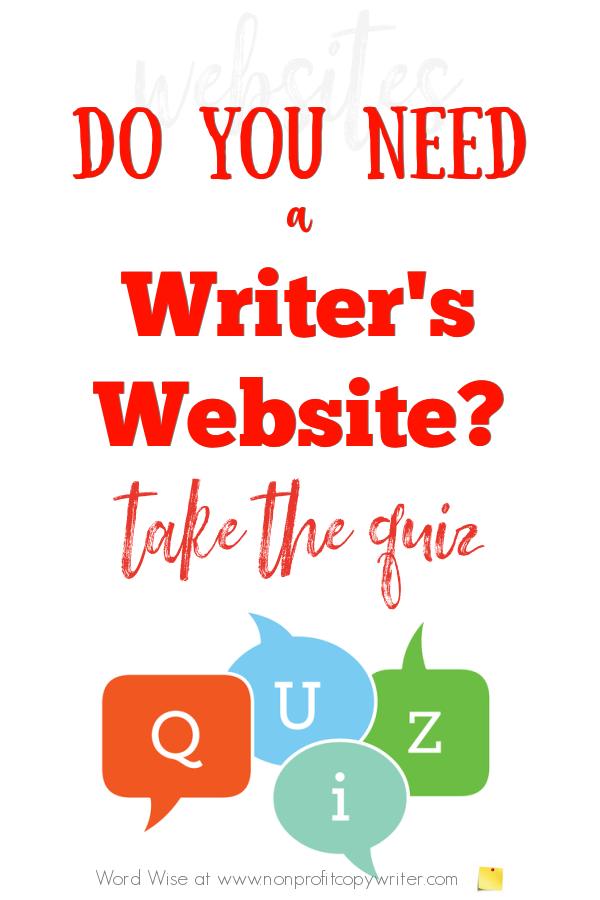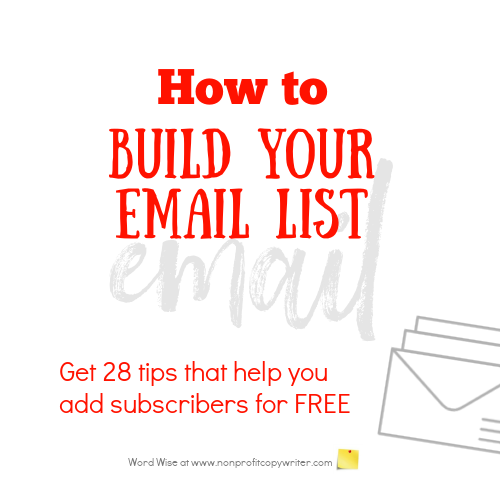Save Time: Get 5 Simple Writing Tips
you can put to use in 10 minutes
Do You Need a Writer Website (or an Upgrade)?
Award-winning writer Kathy Widenhouse has helped hundreds of nonprofits and writers produce successful content , with 750K+ views for her writing tutorials. She is the author of 9 books. See more of Kathy’s content here.
Posted 1.4.25
When I started my freelance journey, the internet was fairly new. Nevertheless, I was serious about getting work and I pursued multiple ways to help clients find me. One of those was building a writer’s website.
Back then, there were no ready-made website platforms or templates. SEO was in its infancy. I created my very first site in Microsoft Publisher — all 5 pages of it. When that software became obsolete, I took a class to learn how to use Dreamweaver to rebuild my site (still 5 pages).
My website was a calling card. It was simply one way for prospects and readers to find me online. At 5 pages, it certainly was not a reservoir of information.
The purpose of my writer’s website changed
But when user-friendly content management systems like WordPress popped up, I couldn’t wait to jump aboard. No longer did I need to write code! Struggles with minuscule errors in HTML faded. I fell in love with the WYSIWYG acronym.
I onboarded onto an easier platform. And yes, I had a learning curve. Yet it didn’t take long for my sole focus to become creating useful content for my readers.
Once upon a time, my writer website was a way to attract paying clients and show prospects that I was credible. Now it’s the hub of my communications and the depository for my content.
Your purpose in building a writer website may change over time, as mine did. Do you need one right now? You’ll find the answer with this helpful little quiz.
Do you need a writer website? Take the quiz
Respond to each statement with a “yes” or a “no.” Keep track of your responses and calculate your answers. Read the explanations in the next section to analyze your results.
- I want to establish a professional online presence.
- I have writing samples to show to prospective clients.
- I want to attract writing clients.
- I have a clear idea of my writing niche and brand.
- I want prospective readers and clients to be able to contact me easily.
- I would like to promote my book or blog or my writing-adjacent services, like editing, speaking, teaching, retreats, graphic design, or coaching.
- I write in a competitive niche.
- I would like to publish (or I already publish) a newsletter and want to add subscribers.
- I would like to create passive income through affiliates.
- I am willing to make time to work on my website.
Check your results for the quiz
1–3 “yes” answers: you have no pressing need to build a writer website right now. Revisit this quiz when you’ve got more experience, clear goals, or your writing circumstances change.
4–7 “yes” answers: you should plan to build a blog or website as soon as you can.
8–10 “yes” answers: get started with that website today.
Why each of these questions is important
1. “I want to establish a professional online presence.”
An online presence gives you credibility. A professional website shows readers and prospects you are serious about your niche, your work, or your cause.
Note: if you expect to build authority with your website, it must appear professional — that is, the navigation is clear, your content is up to date, you add new content consistently, and links are live.
2. “I have writing samples.”
By posting a portfolio of your published work, you show prospective clients what you can do. It’s not hard to display your work, either. Just scan print pieces as images and load them onto your site. And if you write online content for others, you can create a thumbnail and a link to the content you created.
If you’re an early-stage writer, you may not need a website simply to post your portfolio. You could focus on building a portfolio through existing platforms (LinkedIn, Contently, or freelance marketplaces) before investing in a website. Or if you’re a technical or academic writer, you may find niche clearinghouses and academic repositories sufficient to house your portfolio.
3. “I want to attract new writing clients.”
Your website not only gives samples of our work but shows your personality, your story, your writing style, and testimonials from satisfied customers.
Plus, your website allows you to use SEO to build organic traffic and attract even more leads with your luscious, optimized content. And, as you continue to add valuable content to your site each week, prospects can use it as a resource — which in turn makes you more attractive to them.
On the other hand, clients may find you through other platforms like LinkedIn, Fiverr, or Upwork. If you’ve had success there and are satisfied with the referrals, then maybe a website isn’t your top priority right now.
Or maybe you’ve worked solely on platforms like Medium or Substack — and may not need a website if the platform fulfills your needs. And if you’re an established professional relying on personal connections or word-of-mouth referrals, you may find a website unnecessary.
Get this free checklist to help you uncover your unique niche or brand.
4. “I have a clear idea of my writing niche and brand.”
You’ve drilled down who you write for and what kind of content you write. If that’s you, then you don’t need to be at the mercy of any platform’s algorithms. Instead, own and operate your own site.
Then you are freed from restrictions or from blocking that often happens elsewhere, especially on social media. You can purchase a domain name to fit your biz. And you can change your look and feel as your brand evolves, too — colors, logo, fonts — to represent your unique voice, style, and niche.
If you’re still playing at the fringes of multiple niches or goals or types of content, it’s okay to hold off on building a website. Keep experimenting until you’re ready to position yourself.
5. “I need a clear point of contact.”
A well-operated website becomes your online hub. It makes it easy for readers to find you and allows you to communicate directly with them, too.
7. “I write in a competitive niche.”
Why build a website when yours might be “just another one” for recipes or parenting or freelance content writing? Because yours is a way to differentiate yourself from others and show your uniqueness.
Plus, your website gives you the chance to build authority in one angle of a larger niche. A mommy blogger who specializes in baby product safety reviews, for instance, becomes the go-to writer for parents getting ready to outfit a nursery. A quality site gives you a competitive edge.
Download your free checklist: 28 Ways to Build Your Email List for FREE
8. “I want to build an email list.”
Your email list is a large group of people who want and need good information about your particular niche, cause, or topic. It’s a tool that lets you stay in touch with readers, build relationships with them, and yes — eventually turn them into customers along the way. The best way to build an email list? Offer an opt-in on your website.
9. “I’d like to create passive income.”
eBooks, affiliate sales, ads, online courses, printables … you can sell all of them on your website 24/7 and generate multiple income streams that keep churning even while you sleep.
10. “I’m willing to invest time in a website.”
Building and maintaining a website takes time. How much time? That is up to you.
You need to choose a platform, learn to use it, and manage software updates (not my favorite part of owning my websites.) And of course, you need to create content — regularly. It’s not just words that are involved. You also need to understand some basics about SEO and creating images.
But what if you don’t have a big chunk of time right now? No worries. You can build a writer's website a little at a time systematically, rather than all at once. You’re never “behind” if you simply set aside a bit of time each week to learn new skills and build new content. In fact, steady, progressive growth is preferable to a one-shot, build-it-and-forget-it wonder.
Do you need a writer website?
Your answer depends on how you choose to manage your writing life.
- Do you plan to market your work actively … or rely on established platforms?
- Do you want to build a solid piece of intellectual property over time … or do you simply want to write whenever you feel like it?
- Are you at the cusp of starting your writing journey and have not yet accumulated any clips … or do you have multiple blog posts and articles or more to your credit?
Examine where you are in your writing journey. Then decide.
Whether you wait or move forward, you have this in your favor: the internet is fluid. So your website — and the way you use it — can change right along with you.
More Tips for Freelance Writers
The 2 Main Ways to Build Your Freelance Writing Business ...
Turn One Freelance Writing Job into an Anchor Client ...
3 Ways You Can Make Money Writing Content on Your Own Site ...
Don't Market Your Writing. Do This Instead.
7 Streams of Income for Writers ...
Two Types of Readers That Pay You To Write ...
2 Types of Letters That Get You Paid Writing Gigs ...
Should You Specialize in a Freelance Content Writing Niche?
Wannabe Writer? Say Goodbye to Your Worst Enemy …
More tips for freelance writers on our Pinterest board ...
Return from Do You Need a Writer Website? to Nonprofit Copywriter home
As an Amazon Associate I earn from qualifying purchases.
Share This Page

Named to 2022 Writer's Digest list
BEST GENRE/NICHE WRITING WEBSITE


Stop Wasting Time!
Grab your exclusive FREE guide, "5 Simple Writing Tips You Can Put to Use in 10 Minutes or Less"














